Book Reviews by Genre: Humor
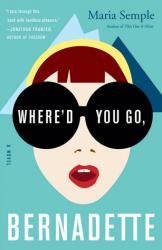
Written creatively through letters, emails, and memos to and from characters, Where’d You Go, Bernadette by Maria Semple is the story of a woman struggling with her past. Bernadette Fox is a former architect whose claim to fame was also her downfall. Now vanished from the architecture world, she lives in Seattle with her successful husband and tenacious daughter, Bee, and does all she can to avoid social interaction. While Bernadette is preparing for the family trip to Antarctica that Bee has been anxiously awaiting, a confrontation with another parent sends her spiraling out of control, resulting in Bernadette’s sudden disappearance. This book explores the difficulties of mental illness and how our actions affect one another, told through many different perspectives. Bernadette’s opinionated personality will have readers laughing, and her insights are truly relatable. A rollercoaster ride of emotions, this novel is beautifully and creatively written to portray a woman’s imperfections and a daughter’s determination to find her mother. Teen and adult readers alike will connect with Semple’s characters and appreciate her sense of humor in Where’d You Go, Bernadette.
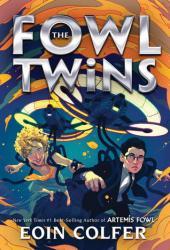
Artemis Fowl is back!
Well, not really. But his little brothers are a more than sufficient replacement. Twins Myles and Beckett have lived a life of education and luxury (with some mild kidnapping thrown in). But everything changes drastically when a small troll appears on their island. Before they know it, they find themselves kidnapped by ACRONYM (a government organization that deals with magic) and working with a fairy to escape from not one, but two baddies - an evil, mustache twirling duke and a deranged nun that are themselves at odds. Will the Fowl Twins escape in time to save their lives and, perhaps more importantly, human-fairy relations for the rest of time?
This was very cute. Colfer was in top form here, and this held all of the characteristics of a middle grade book that I find to be readable (they aren't always my favorite). Myles is snarky. Beckett is a loose cannon (who can talk to animals!!!). The duke has access to insanely quirky gadgets and wouldn't be out of place as a Despicable Me super-villain. The evil nun is an evil nun. The pace moves quickly, but we still get to know our characters. Aside from its general predictability (adults will see all the twists coming before they happen), it's a fantastic middle grade read. If the narrator is any good, I'll add this series to my list of books that I listen to while running.
TLDR: If you loved the Artemis Fowl series, you'll love this one too! It has all of the best elements of the original series with some fun new quirks and characters. 4 stars - I really liked it.
Thanks to Disney-Hyperion and Netgalley for the eARC, which I received in exchange for an unbiased review. The Fowl Twins is available for purchase on 05 Nov, but you can put your copy on hold today!
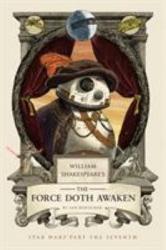
As I’ve been working my way through Ian Doescher’s Shakespearean adaptations of pop culture movies, I think I’ve hit the point where the novelty has worn off. For whatever reason, I didn’t feel like The Force Doth Awaken had the same charm as other entries in this quirky mash-up series. I have a sneaking suspicion that this may be due to one of two factors: 1. The newer movies have more “modern” dialogue that seemed as if it was directly plopped into the Shakespearean format, or 2. The original trilogy had more time to be ingrained in my psyche, and the translation to Shakespearean felt appropriate.
I don’t want to downplay the novelty of this adaptation, though. The voice acting is still superb, and the sound effects add a little something extra that immersed me as I listened to this audiobook. Plus, it’s not like these books are that lengthy anyway. If anything, I’m out a little over an hour of my time to listen to it (since I listen at 2x speed). I did appreciate that Chewie finally received the internal monologue that R2-D2 originally had since these un-translatable individuals still have something to add. I was, however, disappointed that BB-8 didn’t have the same treatment.
One of the other factors with this “translation” that I wasn’t too keen on was the meta aspect that kept winking at the reader and saying, “See? Do you get that reference?” I understand that everything exists in the Star Wars universe, but I think most people who will pick up this book will already know those references anyway and don’t need the coy allusions to other parts of the series. Of course, I’ll still end up listening to the rest of these when I can get them from my library, but The Force Doth Awaken felt like a low point (at least until I get into the prequels).
An almost too modern and meta Shakespearean adaptation, I give The Force Doth Awaken 3.5 stars out of 5.
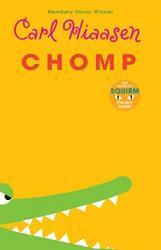
Mickey Cray and his son Wahoo are hired to wrangle various creatures for a survival tv show. Throw in a bat *bleep* crazy leading man along with various and sundry everglades characters and hilarity ensues. Such a fun read! Well, I actually listened to it, but I was still highly entertained.
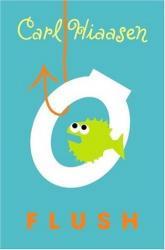
Noah's dad is in jail for sinking the Coral Queen, a gambling boat that dumps raw sewage into the pristine water of the Florida keys. A fun adventure, Hiassen delivers yet again. So far he has done no wrong. I listened to this on cd and was not impressed by the narrator, but Zoe loved the parts she heard and wants to read it now. If that's not a tribute to the book, than I don't know what is.
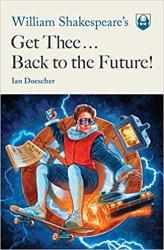
Having already listened to the audiobooks for the Shakespearean versions of the original Star Wars trilogy, I was curious to see how another beloved pop culture film would fare with the treatment. Get Thee…Back to the Future! had a bit more of a challenge when compared to the Star Wars stories. First, as the plot is set in (relatively) modern times, much of our technology had to be “explained” in Shakespearean format (e.g., a car is “a horseless carriage born on fumes of gas and flame”). At least the Star Wars stories seemed to fit in the Shakespearean timeframe a little better.
Despite this clash of modern and medieval, the transformation into Shakespearean form does end up working. I’d probably compare this to some of his comedies like The Taming of the Shrew , Twelfth Night , and Much Ado About Nothing , if for no other reason than the comedy of errors involved with Marty being hit on by his mother. I did appreciate some of the more heady references that were thrown in to make it seem more akin to something from Shakespeare’s era (the constant oedipal references were foremost among them).
One thing that seemed to be missing from the audiobook version of this was the sound effects and music that helped accentuate the Star Wars stories. Granted, Back to the Future didn’t have much in terms of sound effects. However, the music is iconic enough that it would have made a welcome addition. And by music, I mean Alan Silvestri’s score, since all the “pop songs” were addressed in the narrative and motif. Either way, it’s a short read and a fun little experiment to see how the “father of modern drama” can enhance (or ruin, depending on your tastes) our modern favorite films.
The Shakespearean comedy I didn’t know I needed, I give Get Thee…Back to the Future! 4.0 stars out of 5.
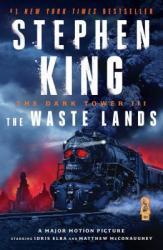
Before I got into reading the Dark Tower series, I saw the movie adaptation. It’s honestly what inspired me to get into the books. While I was a little disappointed with The Gunslinger , The Drawing of the Three showed me the series’ true potential. Moving on from my favorite book in the series, we have The Waste Lands. It's sort of a mash-up of the two earlier books in terms of characters and plot points. However, it's ultimately less than the sum of their parts (and that’s mostly due to the ending). What strikes me with The Waste Lands is how it could have been better than it was.
Those who have seen the movie version of The Dark Tower will recognize a lot of scenes, if not a huge chunk of them. I can see why they cut the two most interesting characters from the film, especially since everyone ends up splitting off to go on their own journeys almost as soon as everyone finally comes together. And while I did appreciate the weird “robot animals” and the riddle motif, I was ultimately frustrated that this core group of four characters didn’t have more time to show what their inter-personal dynamic would evolve into.
At the very least, the strength of the overall series and the thorough and vivid descriptions of this fantasy world were enough to overcome my misgivings about this book. It’s still well done on a technical level, even if some of its better moments are likely to be explored in future volumes. The cliffhanger ending was a bit of a bummer, though, especially since it might be a while before I can get the next book in the series from my library any time soon. I’ll still read it eventually, though, if for no other reason than to see how these characters fare in their travels.
A great book with some wasted potential, I give The Waste Lands 4.0 stars out of 5.
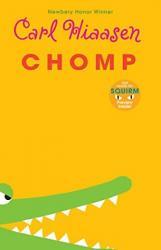
Chomp is a book written by Carl Hiaasen. I would rate Chomp five out of five stars. In Chomp, Wahoo’s mom is on a trip working in China. The main character, Wahoo, and his dad, Mickey, get hired for a TV job. Their family is tight on money, and they are trying to pay off the mortgage of their house. While Wahoo’s mom is in China, he and his dad go on a rollercoaster of exciting events working for the show. It has a very exciting plot and swallowed me into the book. It is a funny tale about the love for animals. I enjoyed the character’s humor and how Wahoo reacted to tough problems. I loved this book and would recommend it to others. It is in a series, but it is a standalone book. I would recommend reading all of the other books in this fantastic series. The author is an amazing writer. That is why I would recommend Chomp to you.
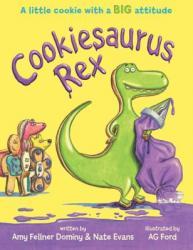
Cookiesaurus Rex comes out of the oven with a huge attitude! He starts out happy with his green frosting until he realizes that other cookies are getting sprinkles and more. Is he happy with his new look? See the different ways he’s decorated and find out what happens to him in the end. This is a fun book with colorful illustrations that help tell the story.
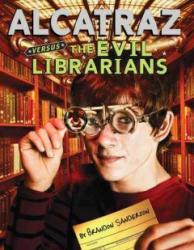
Alcatraz vs the Evil Librarians is a thrilling book about a teenage orphan called Alcatraz Smedry. He is passed along from home to home because he always breaks what is most important to his foster parents. However on his thirteenth birthday, an old man shows up claiming to be his grandfather. He kept saying that he was late. Because he had a talent, a talent for being late. And he tells Alcatraz that he has a talent, a talent for breaking things.
Alcatraz is sucked into a world of crystal knights, bad romance novel golems, and dark oculators. In each book he learns a little more about his family and his talent. Alcatraz learns about the hushlands and the free kingdoms and the evil librarians that want to take over the world. He finds out about the dark talent the talent that will break the world. And he finds out the magic of putting footnotes in a book.
This is one of my favorites because of the funny dialog and the narrator. it touches on some funny topics and includes evil monsters. I would recommend this book to anyone who loves magic and a good story. between evil librarians and reckless smedry's this is one of my favorate series. Alcatraz vs the Evil librarians is a steller book.

Of the original Star Wars trilogy, Return of the Jedi has been my favorite for as long as I can remember. I enjoyed how there was some finality to the stories started back in A New Hope, and Empire Strikes Back. Plus, there were a ton of neat creatures (like the Rancor and Sarlacc) and machines (like the Speeder bikes and AT-STs) that grabbed my attention from a young age. Sure, I can understand the depth of Empire Strikes Back now that I’m an adult, but Return of the Jedi always holds that element of nostalgia for me.
So, how does the Shakespearean version of my favorite Star Wars story stack up? If anything, Shakespeare’s The Jedi Doth Return is consistent with its predecessors, Verily, a New Hope and The Empire Striketh Back . I enjoyed the voice acting and the little changes that made the audiobook more than just a Shakespearean reading of the screenplay. Of course, having listened to three books of this fantastic mashup, it has almost overstayed its welcome. Almost. I still think it’s a genius fusion of two pop culture masterpieces, but at what point does it lose its originality?
Sure, The Jedi Doth Return adds some new bits like songs (which land just about as well as the “added” songs in the 1997 Special Edition re-release). Overall, though, I was a little taken aback at how little dialogue there was in it. Most of the action was described either in chorus or soliloquy, which merely highlighted how much action was present in the original movie. This is great for an action-packed conclusion on the big screen, but it doesn’t land quite as well on the printed page (or audiobook). Despite this, I still think fans of either Star Wars or Shakespeare (or both) should give it a read.
Another consistently funny mash-up of archaic speech and futuristic sci-fi, I give Shakespeare’s The Jedi Doth Return 4.5 stars out of 5.
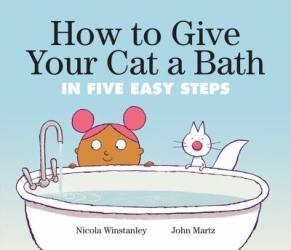
It’s not easy to give a cat a bath as you will soon realize when you read this book! Mr. Flea, the cat in this book, is NOT agreeable to having a bath. The five simple steps that start the book turn into much more work than Mr. Flea’s owner is expecting. Enjoy this book and its pictures and learn what might be the best way to bathe a cat.
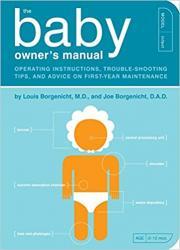
You might be shocked to learn that some men do read the instructions. There have been numerous products that I have purchased over the years which necessitated a read-through of the instructions provided. Usually, these were items of extreme complexity or of thorough interest to me to require fully understanding the items before beginning to use them. The Baby Owner’s Manual might seem like a humorous fusion of a parenting book with a repair manual for a vehicle, but somehow the fusion of these two works better than I would have ever expected.
Published by Quirk Books (who have created other genius mash-ups like Pride and Prejudice and Zombies and Shakespeare’s Star Wars ), The Baby Owner’s Manual takes the complicated and frightening task of keeping a newborn alive and presents the necessary information in a format that any guy can understand. In fact, aside from a few choice substitutions that make a baby seem more like a car than a human, I’d probably keep this book as a useful reference any time something I don’t know how to handle comes up. This will likely be often considering my first child is due near the end of the year.
The only qualm I might have with this book is that some studies have come out since 2003 that have changed a few suggestions the book gives these new parents. Of course, any well-prepared parents will probably be able to pick these inconsistencies out and follow the more current recommendations. In the
end, though, the direct and straightforward method this book uses to convey its information makes it far more useful than just as a gag gift (I’m looking at you, How to Traumatize Your Children).
An instruction manual every man should read, I give The Baby Owner’s Manual 4.5 stars out of 5.
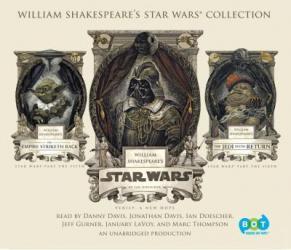
I said it for my review of Shakespeare’s Star Wars , and I’ll say it again: this combination of old verbiage and meter with popular science fiction is a match made in heaven. The follow-up to the first part of the original trilogy, Shakespeare’s The Empire Striketh Back continues to be an amusing exercise that anyone who loves Shakespeare and/or Star Wars will enjoy. Some consider Empire to be the best part of the original trilogy, and its adherence to the plot won’t disappoint. Additionally, the audiobook version continues to use music, sound effects, and voice acting to recreate an experience as close to the source material as possible.
While the audiobook did provide a robust experience of the text (especially the voice actors who recreated Han Solo and C-3PO’s speech patterns), the author’s explanation at the end made me realize there were some aspects that weren’t quite as clear as they would have been if I had just read the book normally. For instance, Yoda’s typically backward speech wasn’t as backward as I would have thought—mostly because the Shakespearean cadence sounds a little backward. Instead, Yoda spoke in haiku, which I’m sure would have been more evident if I was reading the words on the page.
As I mentioned above, Empire is the favorite of many Star Wars fans. However, I’m one of the rare few (like the author) who find Return of the Jedi to be their favorite of these first three films. Consequently, since this book held close to the original plot, it seemed to sag a little between the opening act on Hoth and the third act in Cloud City. At least the added soliloquies from ancillary characters like the AT-AT walkers, random Stormtroopers, and the dangerous creatures of the universe added in some humorous elements to the narrative that weren’t strictly canon.
A fantastic audiobook that still might require a read-through, I give Shakespeare’s The Empire Striketh Back 4.5 stars out of 5.
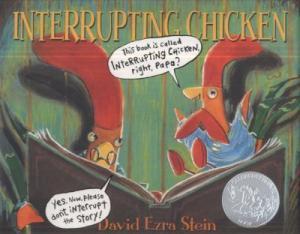
Papa is trying to read little red chicken a story at bedtime, but she keeps interrupting. She can’t help herself! She inserts herself into the story of Hansel & Gretel. She jumps into the story of Little Red Riding Hood. She changes the story of Chicken Little. Will little red chicken ever stop interrupting and go to sleep? Find out when you read this story.

A very plump goose is met by a hungry fox who invites her to dinner. Will dinner go as planned? This humorous book by Mo Willems reminds us to listen to our inner gosling and expect the unexpected. The book involves simple text and a minimum of words allowing readers to explore the pictures to understand the story.
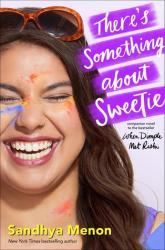
Sweetie Nair is fat. She doesn’t care, but her mom cares. Like, a lot. A lot a lot. Definitely too much. So much that so when Ashish, a hot local boy from a good (and crazy rich!) Indian family tries to date Sweetie, Sweetie’s mom shuts it down. But Sweetie won’t give up without a fight, and so she, Ashish and Ashish’s parents hatch a plan in which the kids will go on four dates. If it works out, they’ll tell Sweetie’s parents. If not, no harm done. Plus, what can happen in four dates? Turns out, a lot.
If you’ve read any of Menon’s other books, this one is completely on brand. I’ve read her other two books, and this one might be my favorite? It’s up there with Dimple, for sure. It’s a funny romantic comedy with endearing, mostly believable characters from a culture that’s different from mine. In addition to reading an adorable book, I get to learn a little bit about Indian Americans. This one has an added element of pointing out our society’s horrible ways of treating fat people. The way a folks react to Sweetie will have you seeing red – but you know it’s unfortunately totally realistic. Luckily, Sweetie is a self-confident young lady, and it was a joy to see her grow throughout the book. Ashish isn’t too bad himself! He has a very believable journey through the course of the book, and was a male lead you could root for even as he made a few terrible decisions.
TLDR: If you’re looking for a light, funny and very swoony read, this one will do it for you. I know it put a smile on my face.
Sandhya Menon is coming to PPLD to be the keynote speaker for Mountain of Authors! Meet her, listen to her give a talk and get a book signed on 27 April at 21c. More information about the event can be found here: https://research.ppld.org/mountainofauthors
Thanks to Netgalley and Simon Pulse for the advance copy, which I received in exchange for an unbiased review. There’s Something About Sweetie will be available for purchase on 14 May – don’t forget to put your copy on hold!
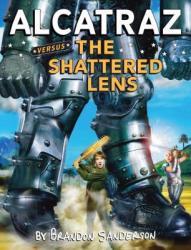
After reading through the last two books in Brandon Sanderson's Alcatraz series, I was hesitant to continue with the fourth book, Alcatraz Versus the Shattered Lens. What I found innovative and hilarious in the first book had become a bit more annoying by books two and three. Book four, however, was a refreshing addition to the series. It helped that the jokes were funny enough that I actually laughed out loud. Moreover, the lore and overall arching plot of the series seemed to coalesce into something that made sense and was actually driving toward a satisfying conclusion.
While I can’t completely disregard the previous two books in the series, I felt that there was probably enough backstory explanation in Alcatraz Versus the Shattered Lens that these other books could be potentially be skipped over altogether. After all, we learn a lot about Alcatraz, his family roots, and the Smedry talents in this book, and I almost wonder if some of these plot points couldn’t have been spread out into previous volumes. It also helped that this book had a clear goal and objective to drive the story toward its various conclusions.
In previous books in this series, Alcatraz has announced that he is awesome or a liar. Here, he admits to being “stoopid,” which adds some humility to the character that had perhaps been missing earlier in the series. There were plenty of other things I liked about this book, including the chapter numbers, the “Shakespearian chapter,” and Alcatraz’s cousin who is really bad at math. The twist near the end also added some realism to both the protagonists and antagonists that I’m now invested and want to see how the series finishes out in the next (and I assume final) volume.
A hilarious return-to-form and vital link for the Alcatraz series, I give Alcatraz Versus the Shattered Lens 4.5 stars out of 5.
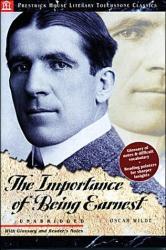
Over the years, I have been assigned to read a multitude of books and plays for English classes - some of those writing pieces I have never committed to and read thoroughly. This year in AP Literature, The Importance of Being Earnest was assigned and was not amongst those writing pieces. In many of the English classes I have enrolled in, there are numerous books or plays - especially Shakespeare - that I have read which might be interesting but the diction is archaic. The words and phrases are not used modernly and therefore, what is written is difficult to understand in the absence of translations or SparkNotes. Despite being published in 1895, The Importance of Being Earnest was an easy read because the play is easily humourous.
The play pursues wealthy and bored protagonists, Jack Worthing and Algernon Moncrieff, as they court two women, Gwendolen Fairfax and Cecily Cardew, pretending to be men named Ernest. Their “Bunburying” depicts the theme that idle hands indulge in mischief. Jack, who resides in the country, introduces a devious and unruly brother named Ernest who resides in the city so that he can be reckless in one place while also being arguably mature in another. Algernon pretends to have to check in on a pale and sickly fellow named Bunbury when he is introduced to responsibilities or events he does not desire to participate in. Eventually, upon hearing of Cecily Cardew, Jack’s ward, from Jack, he pretends to be Ernest as well. The two characters utilize their separate versions of "Bunburying" for their own pleasure rather than for being productive, depicting their own values of dishonesty and deceit.
The characters are self-concerned which is unfortunate because during the 1890s, the time in which this play is set, the Victorian Era endured multiple widespread conflicts including overpopulation, poor sanitary conditions, child labor, and religious insecurity - none of which are mentioned by any of the four characters.
Ultimately, the theme of the play may be applied to the modern era which permits The Importance of Being Earnest to be more relevant when you compare the Victorian upper class to, for example, the Kardashians or other celebrities.
The humorous aspect of the play was Oscar Wilde’s use of epigrams, or clever and paradoxical expressions. Predominantly delivered by Algernon, my favorite of the epigrams was “The amount of women who flirt with their own husbands is scandalous. It is simply washing one’s clean linen in public.”
Additionally, this play is a short read with only about 75 pages.
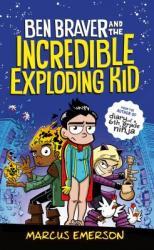
***THIS BOOK WAS RECEIVED FROM A GOODREADS GIVEAWAY***
Once again, I seem to have jumped in on the second book of a series. Fortunately, there was plenty of exposition detailing the events of The Super Life of Ben Braver. Maybe a little too much exposition. This sequel took a little long getting to its own story because of this, along with a bit of heavy-handed foreshadowing as well. Regardless of its slow start, Ben Braver and the Incredible Exploding Kid is a pretty standard middle-grade book that calls upon the success of the superhero genre to package a lesson about pride between action set pieces.
While there are some parallels between the X-Men series, I feel the main character’s arc is perhaps a little more similar to early My Hero Academia. Plus, it wouldn’t be a middle-grade story without a bit of a Harry Potter feel to it as well (i.e., a unique main character with a semi-bumbling male friend and an incredibly smart female friend). At the very least, I found the illustrations sprinkled throughout to be well done. They certainly contributed to the comic book hybrid feel of the story, which is probably what draws the X-Men comparisons.
I won’t fault this book too much for its heavy-handed approach toward the main character’s social faux pas since this book is basically for children. That being said, I did find some of the lore and intricacies of the greater story arc to be perhaps a little elaborate. I’m sure if I’d read the first book, this would be less so, but it still seems slightly overcomplicated at times. In the end, I liked some of the unique (if not sometimes gross) superpowers of these kids, and I’d recommend this series for any children who might want to make the jump from comic books to chapter books, and vice versa.
A comic book/chapter book hybrid with a semi-standard take on superheroes, I give Ben Braver and the Incredible Exploding Kid 3.5 stars out of 5.
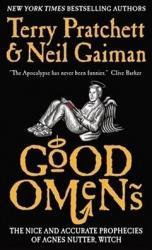
Good Omens is humorous take on Armageddon and the final battle between Heaven and Hell. Complete with an angel and a demon, who get along better with each other than with their immortal counterparts, two witch-finders, Satanic Nuns of the Chattering Order of St. Beryl, aliens, and an eleven year old Antichrist, Good Omens takes a completely different take on the Apocalypse. All predicted by a witch that lived 300 years ago, Good Omens is full of sarcasm, humor, fun, and adventure along with a moral that tells us to look for the good in everyone, even demons. I highly recommend this book for any high schooler or adult looking for a little bit of humor in life.
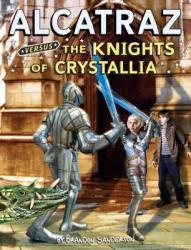
You know, it’s difficult to review a book that already highlights its flaws in the text itself. Part of me wonders if the reviews from the second book in the series were bad enough to warrant this kind of meta self-awareness. In the end, while Alcatraz Versus the Knights of Crystallia does take the time to address these weaknesses in its story and characters, it still doesn’t excuse the fact that they’re in there in the first place. These winking soliloquies seem to gloss over the fact that the book knows what’s wrong with it, but instead decides to gloss over it with self-reference instead of fixing the root of the problems themselves.
By this point in the series, I have come to terms with its middle-grade silliness and occasional bathroom humor. I loved the rule-breaking first book in the series, only to become annoyed by this constant fourth-wall breaking that happened in book two. By book three—this book—I finally came to terms with the fact that I’m not the target audience for this book, despite how well-written it is and how intricately its fantasy world has been created.
Perhaps due to my acceptance of this series for what it is, I felt the plot and character development were better in this part of the series—even if it did seem to trend toward “after school special” territory more often than not. Not only did we get to see more of Alcatraz’s parents (although, not nearly enough in my opinion), there was a lot more world-building that helped to flesh out this strange land introduced in previous volumes. Plus, the character who was a former librarian was (and is) probably my favorite character in the series right now.
More of the same self-aware silliness from Brandon Sanderson, I give Alcatraz Versus the Knights of Crystallia 4.0 stars out of 5.
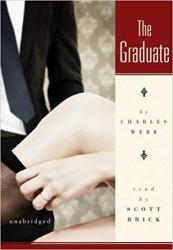
If I could condense this book down to a single phrase, it would be “What?” It’s not that I didn’t understand this book, it’s more that this single word/question was used for every third line of dialogue. Not only was this incredibly annoying to read—as every character seemed to have hearing problems that required the other speaker to repeat themselves—but it just seemed to pad out an already weak plot. I have no idea how this book became so famous that it led to a much superior film adaptation, but now I know that nobody should bother reading this book because of its inspiration for the movie.
Let’s talk about character motivations next. Nothing ever made any sense. Sure, there’s a bit of existential ennui involved with finishing something you excel in (school, in this case), but the actions of the main character only make sense up until a point. Once we hit the third act, there’s just a series of random actions that aren’t grounded in reality. This is also not to mention that the characters around him, especially the primary love interest, also make illogical decisions that aren’t founded in any sort of reality. At least this book is short enough that you’re not going to waste much time reading it.
Maybe I’m just missing the point of this book. Perhaps it’s an examination of the consequences and realizations that come from living a life that seems to have no meaning. I mean, I get the counter-play between the newly-disillusioned Benjamin and the almost permanently-disillusioned Mrs. Robinson; butwhenthe entire thing is filled with awkward and nervous dialogue that constantly repeats itself, I can’t help but think that there isn’t anything significant there. Even the ending was so abrupt and unfulfilling that I had to thank the movie version for its subtleness in revealing the characters’ realization of what they’ve done.
A truly sub-par story that was made into an above average movie, I give The Graduate 2.0 stars out of 5.
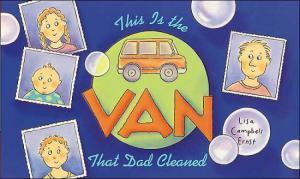
Dad has cleaned the van. It’s all sparkly and shiny. This cumulative,
rhyming story chronicles what happens next. It’s a fun narrative that many
children and their parents can relate to.
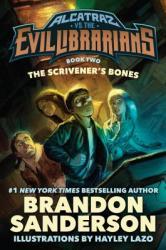
Earlier this year, I read Alcatraz Versus the Evil Librarians and absolutely loved it. Consequently, I had high hopes for the next book in this series, Alcatraz Versus the Scrivener’s Bones. While there was still the same amount of self-awareness and humor in this book, it felt a little…off. Perhaps I should have read these two books closer together, but I had some trouble coming up to speed in the beginning and wasn’t entirely sure why the “goal” of this book was to find Alcatraz’s father. In any case, Sanderson’s world-building is still in top form here.
Of course, the “cute” way that this series was self-aware when I read the first book was a bit more annoying this time around. It almost felt like every chapter had to have a soliloquy, even if it didn’t link itself to where the plot was at the time—which often broke the flow of the action. Similarly, while the randomness introduced in Versus the Evil Librarians did seem to have some purpose, it seemed to have less of a purpose in this book. It felt like it was randomness for randomness sake, even if some of it did eventually come into play.
Despite the things that made the first book endearing becoming a little more grating in this book, I did enjoy the magic system, and more in-depth explanations of the lore were explored in this sequel. Things like why the main character is named Alcatraz and a better explanation of the “powers” of his family members helped round out the questions that weren’t necessarily obvious in the first book but still needed to be answered at some point anyway. The action was fantastic (if not against all laws of physics), and I wouldn’t mind seeing how the relationship between Alcatraz and Bastille develops in later books.
An amusing and well-rounded “silly fantasy,” I give Alcatraz Versus the Scrivener’s Bones 4.0 stars out of 5.
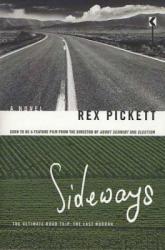
When I got into this book, the only things I knew about it were that it was about wine and it was made into a movie of the same name by Alexander Payne. Unfortunately, unlike a good wine, this book doesn’t seem to have aged well. Maybe people were able to put up with buddy comedy sex romps back in the early2000’s, but the social climate has changed considerably since then. I doubt a book like this would be written today, at least without some outcry from people who find the women in it to be inherently objectified.
Most of my issue with this book comes down to the characters. I’ll give the author credit for creating individuals that made me react to them so vehemently. The problem is that I hated these characters. I hated Jack for being so sex-crazed that he felt obligated to satiate his urges mere days before his wedding. Ihated Miles for being the stereotypical alcoholic failing author. If you wanted a template for poor life decisions, I think these two characters would fit the bill. There wasn’t much (if any) redemption in either of their story arcs, and both of them just seemed to enable their worse selves.
In the end, this book is supposed to be a comedy. At least, it’s a comedy in the sense that it ended with a wedding (as most comedic plays and musicals usually do). Sure, it’s filled with witty banter and some good stretches of natural dialogue, but there was hardly any vulnerability of the characters to give them any grounding. One moment near the end briefly pulled away to let Miles reminisce, but I would have liked some more consequences that would have forced both men to change for the better. And maybe that’s the point: real life doesn’t work that way, and I hate that there are real men out there who have these very same faults.
Terrible people in somewhat amusing situations, I give Sideways 2.5 stars out
of 5.
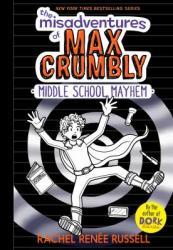
It's about a teenage boy who deals with bullies and he ends up in the ventilation systems of his school on the weekend and he found burglars trying to steal the schools new computers.
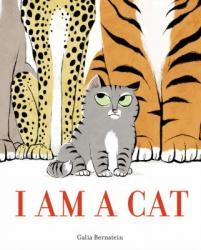
Lion, Cheetah, Puma, Panther, and Tiger say that Simon isn’t a cat. After all, cats have certain characteristics. Can he convince them that he’s really a cat? Read along to find out.
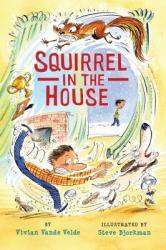
Twitch, the school-yard squirrel and Cuddles, the dog next door, don’t get along. Twitch narrates the book and explains why squirrels have such a better life – they have no rules. During the holiday celebrations, Twitch heads inside Cuddles’ house and mayhem ensues. The day turns serious when a young human gets into trouble. Can Twitch & Cuddles work together to save the boy? Read & find out.
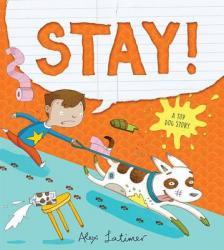
Ben loves his dog, Buster, but has to leave him with Grampa when he goes on vacation. He remembers and writes down all sorts of instructions for Grampa. As he remembers more things, he writes postcards from vacation. Eventually, he remembers what he forgot, but it is too late. Grampa & Buster are already on the way to the post office. Read what happens as Buster learns how to behave – at least most of the time.